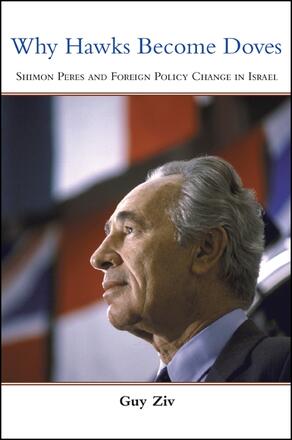
Why Hawks Become Doves
Shimon Peres and Foreign Policy Change in Israel
Alternative formats available from:
Investigates how leaders’ personalities shape important foreign policy shifts.
Description
Why do hawkish leaders change course to pursue dovish policies? In Why Hawks Become Doves, Guy Ziv argues that conventional international relations theory is inadequate for explaining these momentous foreign policy shifts, because it underestimates the importance of leaders and their personalities. Applying insights from cognitive psychology, Ziv argues that decision-makers' cognitive structure—specifically, their levels of cognitive openness and complexity—is a critical causal variable in determining their propensity to revise their beliefs and pursue new policies. To illustrate his point, he examines Israeli statesman Shimon Peres. Beginning his political career as a tough-minded security hawk, Peres emerged as one of the Middle East's foremost champions of Israeli-Palestinian peacemaking. Drawing on a vast range of sources, including interviews with Peres and dozens of other political elites, archival research, biographies, and memoirs, Ziv finds that Peres's highly open and complex cognitive structure facilitated a quicker and more profound dovish shift on the Israeli-Palestinian conflict than his less cognitively open and complex rivals.
Guy Ziv is Assistant Professor of International Relations at American University's School of International Service and the author of Readings in U. S. Foreign Policy: Revised First Edition.
Reviews
"While several books have been written about Shimon Peres, this is the first academic book-length study, and as such it is very welcome … this is a well-written book, accessible to all informed and educated readers, not only academic experts, though all will no doubt benefit from it. " — Israel Journal of Foreign Affairs
"…Ziv's lucid writing style makes his book accessible to students and a general readership, a feat that should not be taken for granted. This book keeps the reader engaged and ultimately makes an important contribution to the discipline of international relations, as well as providing a fresh outlook on the transformation undergone by one of Israel's most prominent statesmen, Shimon Peres. " — Israel Studies Review
"…a very welcome addition to the discipline. " — Israel Studies
"Guy Ziv has written a masterful and intriguing study that breaks new ground in demonstrating the importance of the individual leader in framing foreign policy. The comparisons of Peres, Rabin, Begin, and Shamir are extraordinary, and effectively demonstrate the advantages of a leader who has a talent for adapting to altered conditions and listening to differing perspectives. It's both an absorbing page-turner and a stimulating eye-opener. " —Steven L. Spiegel, coauthor of The Peace Puzzle: America's Quest for Arab-Israeli Peace, 1989–2011
"Ziv has written a fascinating account of how some leaders (Peres, Rabin, Sharon) are able to shift their goals and strategies to a less conflictual mode, and how others (Shamir, Begin, Netanyahu) are simply incapable of doing so. Ziv makes a strong case for the proposition that the cognitive structure of leaders matters. A turn towards peace requires national leaders who are personally capable of making that turn. Ziv's tome is a substantial contribution to the literatures of foreign policy analysis and political psychology, and is an important read for all who seek a more peaceful world. " — Valerie M. Hudson, author of Foreign Policy Analysis: Classic and Contemporary Theory